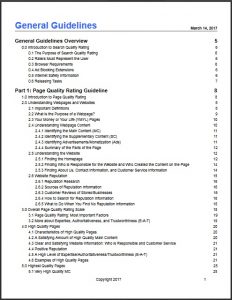As of 2017 there is a lot of questionable news out there. You never know what will surface in search results. While Google’s results are fairly accurate there have been many infamous examples of search results which serve up incorrect information which goes against scientific consensus and historical facts. I believe that is what Google is going to be targeting in the near future.
Recently Google has taken steps to keep questionable news out of their “news” section and now they are focusing on delivering quality search results. Then again, this has been their focus since day 1, and algorithms in 2018, 2019, 2020, 2030 and beyond will likely be focusing on the same thing- focusing on a searcher’s intent.
Google Fake News Algorithm
The Google algorithms are tweaked over 800 times each year. Just a few weeks ago I wrote about a potential Google Fake News Penalty and why they may want to implement one. But then I began thinking maybe they will implement an algorithm change. How would they accomplish this though? Then yesterday, the 2017 Google Quality Rater Guidelines were released. In several areas throughout the document Google tells raters how to flag certain types of content. An interesting point to make here is that Google does not want to “penalize” this content. Some people want an “alternative” view and their job is to connect people with what they are looking for. Some people want satire. Some people want adult material. Some people want hate. Google is not going to penalize this content probably ever.
The raters submit feedback which Google engineers may use for future algorithm changes.
Notable findings in the rater guidelines include Google targeting sites which have:
- Inaccurate or misleading content
- Misleading titles and clickbait titles
- Upsetting or offensive results for queries (which are not obviously seeking upsetting or offensive content)
- Pages which directly contradict well established historical facts
- Pages which directly contradict well established scientific or medical consensus (for queries seeking scientific or medical information)
Additionally, Google updated their YMYL section to help rates identify credible news organizations.
While Google does not call this “fake news” many of the steps they are taking will very likely affect future algorithm tweaks to make sure search results continue to improve on and match user intent.
- Google “Pure Spam” Penalty Deindexes Sites March 6 2024 - March 12, 2024
- What Happened to ChicagoNow.com? - August 30, 2022
- The December 2021 Google Local Pack Algorithm Update - December 17, 2021





A Google News employee just did an interview where he discussed how Google’s News algorithm could be tweaked to detect fake news in real time:
https://shift.newco.co/how-to-detect-fake-news-in-real-time-9fdae0197bfd